Jamshid Andalibi, one of the most famous ney players in Iran, passed away on the fifteenth of Esfand, 1402, at the age of 66 due to a heart attack at his private residence. Andalibi was a member of a family that had a significant presence in the field of Iranian music in the sixties and…
Read More
Tag Archives: Jamshid Andalibi
Jamshid Andalibi passed away!
Latest posts
- Transition to Enlightenment: Six Lectures on Mozart’s String Quartets (5)
- Nasser Masoudi: The Voice of Gilan and a Legacy of Iranian Music
- Farhad Poupel: The Voice of the Shahnameh in the Orchestras Around the World
- Five Major Myths About Mozart’s Life
- Bahma Rajabi Passed Away!
- Reza Vohdani; Unveiling unpublished works, preservation of Iranian classical music
- Ahmad Pejman Passed Away!
- Timeless or Timely: The Role of Historical Context in Defining Artistic Value
- Leading the Charge in Censorship
- The Legacy of Khosrow Jafarzadeh
- Transition to Enlightenment: Six Lectures on Mozart’s String Quartets (4)
- Fereydoun Shahbazian, An Iranian Musical Icon Passed Away
From Past Days…

Ennio Morricone’s music for Quentin Tarantino’s The Hateful Eight
After watching Quentin Tarantino’s latest movie, The Hateful Eight, everyone was excited by its novel music besides the beautiful scenes of blood and guts.
The Hateful Eight is the first collaboration between the world-famous film music composer, Ennio Morricone, and Quentin Tarantino as a famous director.
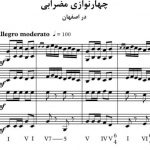
Inefficiency of some chords and harmonization systems in Iranian music
Discussions and research have been conducted on the harmonization of “dastgah” and melodies in Iranian music, and several books have been published on this topic, including “Armenian Music of Iran” by Ali Naghi Vaziri, “Harmony of Iranian Music” by Farhad Fakhreddini, and “Harmony of Iranian Music” by Ali Ghamssari. A master’s thesis titled “Presenting a Solution for Harmonizing Based on the Structure of Tritone Intervals” was written by Atefeh EinAli in 2014. Additionally, the invention and use of “Even Harmony” by Morteza Hannaneh should be mentioned.
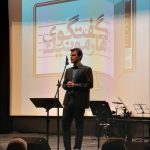
Celebrating 20 Years of Harmony Talk’s Journey: Resilience, Evolution, Honoring the Legacy and Navigating Future Growth
In a momentous celebration of two decades, the “Arasbaran Cultural Center” was the stage for the 20th anniversary of “Harmony Talk”, an online journal that has become a cornerstone in the music community. Sadjad Pourghanad, the editor-in-chief, delivered a speech that resonated with gratitude and vision.

Homayoun Rahimian & Iran’s National Orchestra
The Roudaki Foundation presented the permanent conductor of the National Orchestra (Orchestr Melli), Homayoun Rahimian, in a ceremony, and finally, after four years, the national orchestra found a permanent conductor. Homayoun Rahimian is the fourth permanent conductor of this orchestra after Farhad Fakhreddini, Bardia Kiaras, and Fereidoun Shahbaziyan. He, who has previously had experience of conducting concerts besides being Meister’s concert of this orchestra, performed the concert “Autumns” on the 20th of Tir, performing works by Rouhollah Khaleqi, Javad Ma’roufi, and Hossein Dehlavi.
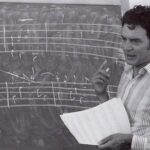
Ruggero Chiesa’s Legacy
Written by Peyman Shirali Translated by Mahta Mottaghi Since many years ago, I had the intention of writing an article on the Italian maestro Ruggero Chiesa and his musical life; but his ingenuity and the immense legacy, which is impressive for not only me, but also almost everyone who knows him properly, made it hard for me…
Read More
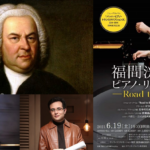
Farhad Poupel’s piece, Road to Bach, performed at Suntory Hall
On June 19, 2021 , young Iranian composer and pianist, Farhad Poupel’s piece, Road to Bach, was performed at the prestigious Suntory Hall by the great Japanese pianist, Kotaro Fukuma. The piece was commissioned by Kotaro Fukuma to have its world premiere in Suntory Hall during a concert by the same name.

Leading the Charge in Censorship
Davoud Pirnia, writer and musicologist was the founder of “Golha” (Flowers of Persian Song and Music) programs on Tehran Radio (1956-1966). He received his early education from his father, Hassan Pirnia (Moshir al-Douleh), and several tutors of the time (Taraghi, interview, July 1989) and continued his studies at Saint Louis School in Tehran and then in Switzerland and graduated in law. While studying law, Pirnia got acquainted with European classical music. Upon returning to Iran, he was employed by the Ministry of Justice and founded the Lawyers’ Guild. Then he was transferred to the Ministry of Finance and established the Department of Statistics in this ministry. Later, he became the head of the state inspection office at the Prime Ministry; he was, then, promoted to the position of the Deputy Prime Minister (Navab Safa, interview, August 1999)
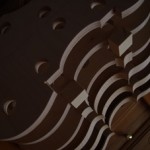
Violin’s inner mold, an essential factor in developing the idea of violin
A part of the secrets of the masterpieces from the golden era lies in the special design of the instruments, as a result of a profound insight to and awareness of the significance of the precise calculation of the various components of the object of arts being created, such as making a violin or a bow.

HarmonyTalk Journal’s Twentieth Anniversary Celebration
On the 10th of Khordad, 1403 (equivalent to May 30, 2024), the twentieth anniversary celebration of the online journal “HarmonyTalk” took place at the Ersbārān Cultural Center. The event garnered such interest from enthusiasts that the venue was completely filled.
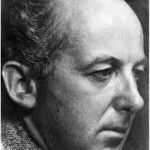
Henry Cowell: “Persian Set”
Persian Set: Four Movements for chamber orchestra: Moderato; Allegretto; Lento; Rondo
Henry Cowell, one of the most innovative American composers of the 20th century, was born in 1897. Cowell and his wife visited Iran in 1956 and stayed there the whole winter, upon the invitation by the Iranian Royal Family, when he composed his album “Persian Set” in four movements for chamber orchestra. His composition is expressive of the characteristic quality of the Persian or the Iranian music.